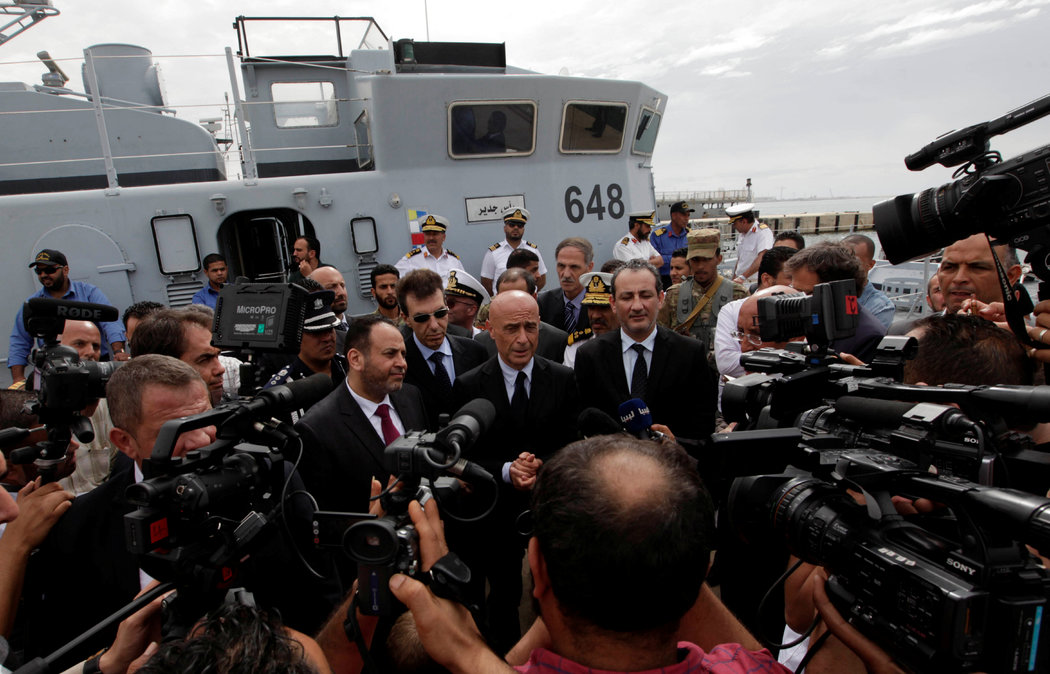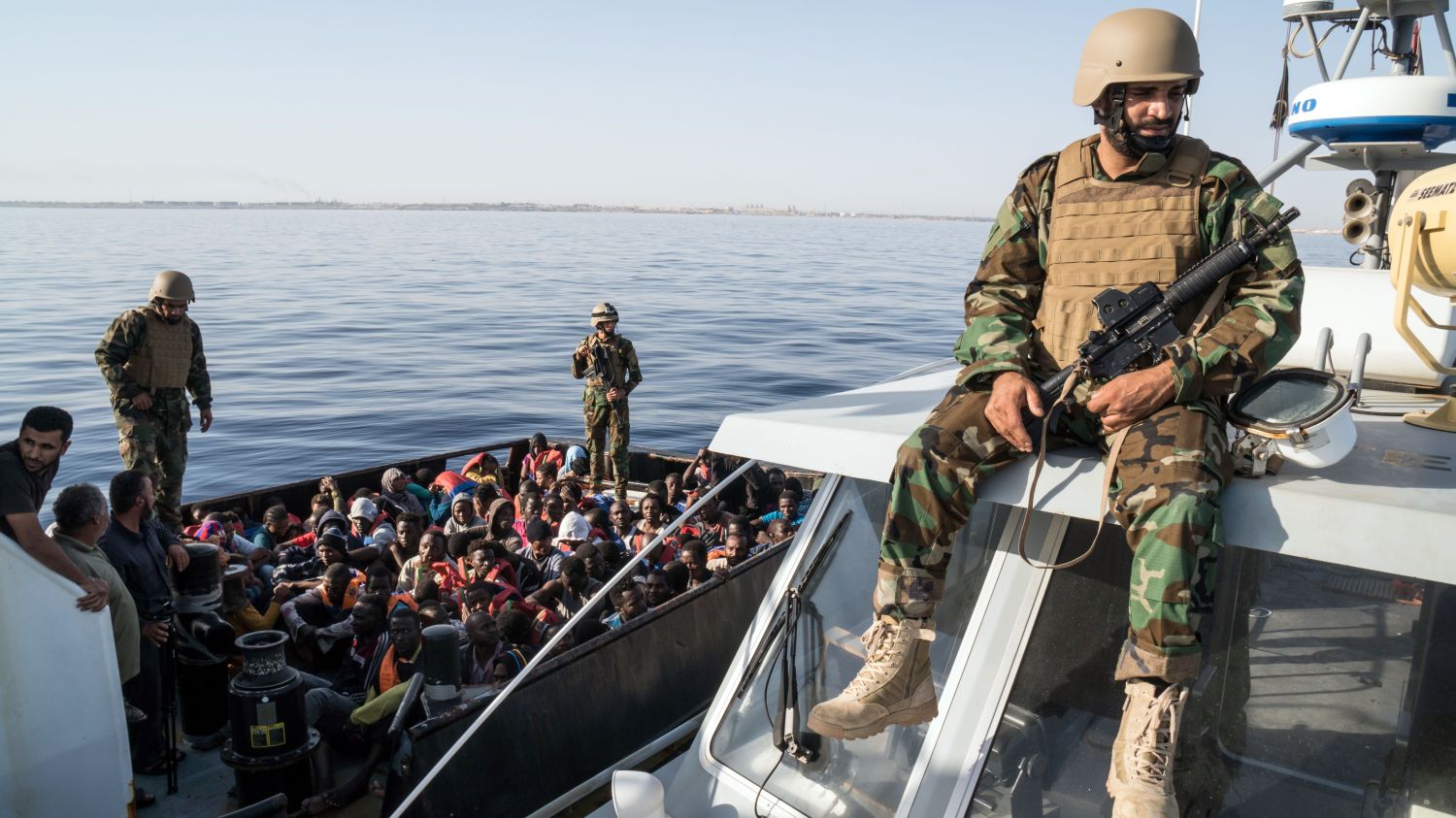EU externalisation and orchestration in the Central Mediterranean and Libya

© Ismail Zitouny / Reuters
Since 2016, the EU and coastal Member States—in particular Italy and Malta—have implemented a joint strategy aimed at stemming migration in the central Mediterranean. This has included, among other mechanisms, the criminalisation of search and rescue NGOs and the progressive substitution of EU and Member States’ rescue assets with those not equipped to perform rescue activities, e.g., aerial assets. The responsibility to perform search and rescue—‘weaponised’ as a form of border control—has thus been outsourced to the so-called Libyan Coast Guard, whose establishment and operation is enabled by the EU’s material, technical, and political support. In parallel, private actors, including merchant vessels, have also been increasingly called upon to intercept migrant boats—framed as search and rescue operations—and ordered to perform illegal returns to Libya.
While the ‘externalisation’ of border control has become progressively distanced since the decision in Hirsi Jamaa and Ors v Italy, the EU and Italy continue to have a decisive role in the creation and maintenance of the b/ordering regime in the central Mediterranean. SS and Ors v Italy and SDG v Italy challenge the anachronistic and structurally narrow constructions of jurisdiction under international and European human rights laws through the conceptualisation of alternative forms of jurisdiction—namely ‘functional jurisdiction’ and ‘impact jurisdiction’.
cASES
-
S.D.G. v Italy: Privatised ‘pushbacks’ and human rights abuses
Filed in December 2019 with the UN Human Rights Committee, SDG v Italy challenges so-called ‘privatised pushbacks’—in which states engage commercial ships to return intercepted migrants to unsafe locations in disregard of various legal obligations, including human rights law.
-
S.S. and Ors v Italy: Extraterritorial policies of ‘contactless control’
Filed in May 2018 with the European Court of Human Rights on behalf of 17 survivors of a 130-person shipwreck off of Libya, the case asserts Italy’s “contactless control” and “functional jurisdiction” over Libyan actors implementing the EU and its Member States’ refoulement and containment regime in the central Mediterranean.
Financialised migration control: Bureaucratisation and irresponsibility for refoulement and border violence

© Taha Jawashi / AFP
The financialisation of migration control has contributed to the bureaucraticisation—and thus irresponsibilisation—of EU migration control policies, both at the EU’s external borders, e.g. Greece, and at its externalised borders, e.g. in Libya and the central Mediterranean. The legal struggles we have undertaken with others to challenge these cooperative frameworks for the mass and structural violence against migrants that they enable and perpetuate date back to 2019, seeking much-needed transparency and public accountability for their harmful impacts.
These include two sets of interventions. The first set of legal interventions, submitted in April 2020, challenges financialised migration cooperation with Italian and Libyan authorities on grounds of financial mismanagement and maladministration, before the European Court of Auditors and the European Parliament’s Petitions Committee respectively, for enabling a host of abuses against migrants making their way to Europe, including their return to and containment in Libya. The second set of interventions, launched in July 2023 with the European Ombudsman, seeks redress for the harmful impacts of the EU’s funding and support for border control operations by Greece as an EU external border Member State.
Despite legislative and institutional reforms over the past years, the Commission has remained unable and unwilling to ensure proper fundamental rights monitoring and continues to wrongly rely on both Member States and third parties to enforce its border regime.
INTERVENTIONS
-
Systemic unaccountability for EU-funded ‘pushbacks’ in Greece
Submitted to the European Ombudsman on 24 July 2023—together with Legal Centre Lesvos, Mobile Info Team, HIAS and Equal Rights Beyond Borders—the complaint challenges the legality of the European Commission’s material and other forms of support to Greece’s border enforcement operations and infrastructure of illegal expulsions (‘pushbacks’) at Greece’s Evros river and Aegean sea borders.
-
EU-funded refoulement and containment in the Central Mediterranean and Libya
Two interventions—before the European Court of Auditors (ECA) and the European Parliament’s Petitions Committee (PETI)—make up the first set of challenges to legally expose and challenge the structures of the EU’s externalisation, orchestration, and financialisation of migration control in the Central Mediterranean.
Aegean ‘driftbacks’: Abduction, abandonment, and endangerment

© Turkish Coast Guard
In 2020, during the first months of the Covid pandemic, the Greek authorities’ ‘pushback’ tactics begun including the weaponisation of rescue equipment to perform violent and illegal expulsions: Greek officials would forcibly expel migrants intercepted at sea, or apprehended on Greek islands, from Greek territory by abandoning them at sea in inflatable, non-navigable rescue rafts. This practice has since 2020 become a systematic policy, which Forensic Architecture has termed ‘driftbacks’. Driftbacks are carried out alongside other, longstanding and well-documented forms of maritime ‘pushbacks’ and border violence in the Aegean Sea.
There are currently at least 32 applications pending before the European Court of Human Rights seeking to challenge the practice of ‘driftbacks’, which we argue is a form of torture that exposes migrants to refoulement and grave risks to their life. G.R.J. v Greece is one of the only cases brought by an unaccompanied minor, who was abducted and expelled from a refugee camp in Samos without paper trail or means of recourse. A.A.H. and H.J. v Greece was filed on behalf of two Guinean brothers who were abandoned on a raft at night after arriving on Lesvos. The cases seek reparative truth for the active efforts by the Greek authorities to conceal ‘driftbacks’—with a broader view to challenge the EU’s funding of and assistance to these operations, including through the European Border and Coast Guard Agency, Frontex.
cASES
-
G.R.J. v Greece: Abductions and torture in the Aegean
G.R.J. v Greece was submitted to the European Court of Human Rights in March 2021 on behalf of an unaccompanied minor who was abducted, illegally detained and expelled to Turkey by Greek officials through life-endangering abandonment at sea.
-
A.A.J. and H.J. v Greece: Abductions and Torture in the Aegean
A.A.J. and H.J. v Greece, submitted to the European Court of Human Rights in May 2021, challenges Greece’s abductions and expulsions of asylum seekers in the Aegean Sea.
‘Pushbacks’ as enforced disappearances

© Forensic Architecture
In late September 2023, the UN Committee on Enforced Disappearances formally adopted its first General Comment on the application of the Convention on Enforced Disappearances in the context of migration. The General Comment is based on decades of migrant-led struggles, particularly throughout the Americas, in resistance of mass killings and disappearances of migrants, even after death, by bordering regimes and racialising state violence. Such policies of deliberate endangerment, abandonment, and unprotection in borderlands are extreme forms of racialised group-based repression, persecution, and social erasure through summary expulsions (‘pushbacks’) which entail the person’s removal from recognition and protection of the law.
We have documented cases of both direct and indirect enforced disappearances, and sought to advance the application of this legal and political category to the systemic practices of border violence through different politico-legal interventions. A central and pending intervention formative to this issue-area is the individual complaint against Greece brought before the UN Human Rights Committee by Fady, a Syrian refugee in the EU, whom we have been accompanying with others since 2018. F.A.A. v Greece is the first complaint against Greece before the Committee arguing that ‘pushbacks’ may constitute acts of enforced disappearance and demanding systemic redress for broader systemic ‘pushback’ policies.
CASES
-
F.A.A. v Greece: Illegal expulsions and enforced disappearance at Evros
Filed in November 2020, and registered and communicated to Greece in November 2021, this is the first individual complaint before the Human Rights Committee regarding Greece’s systemic policy of summary expulsion and racialising violence at Evros, arguing that such practices constitute enforced disappearances.
Containment and abandonment at the EU-Belarus border

© Valsts kanceleja
On 10 August 2021, Latvia introduced a state of emergency (Order No. 518 of the Cabinet of Ministers of the Republic of Latvia on the Declaration of Emergency Situation) blocking migrants from accessing asylum procedures in four Latvian regions. Since, Latvia is the only EU Member State that has explicitly legalised ‘pushbacks’. For over a year, its border area became an informal detention zone in which migrants—many from Kurdish and Yazidi communities—were subject to inhuman and degrading treatment, including torture, while being denied the possibility to access international protection. Latvian authorities have actively concealed information on ‘pushbacks’, and EU institutions have persistently failed to take any enforcement measures in response to this ongoing situation, enabling and endorsing this “lawless law” (Ancite-Jepifánova, Ganty & Kochenov).
The cases of A.R., A.Z., and S.A. were the first set of interventions to be brought before the Latvian authorities concerning patterns of violence taking place along its border with Belarus. After having been rejected by the Latvian authorities due to ‘insufficient evidence’, though without proper investigation, they are currently pending before the European Court of Human Rights (see A.R. v Latvia, A.Z. v Latvia, and S.A. v Latvia).
CASES
-
A.R., A.Z., and S.A.: Complaints before Latvia’s Public Prosecutor
Filed between September and December 2022 with the Latvian Public Prosecutor, these three complaints concern the treatment that the applicants have endured at the Latvia-Belarus border at the hands of Latvian authorities, respectively between October 2021 and April 2022 (A.R.), December 2021 and February 2022 (A.Z.), and August 2021 and April 2022 (S.A.).
-
A.R. v Latvia, A.Z. v Latvia, and S.A. v Latvia: Torture, life endangerment, and refoulement in Latvia-Belarus borderlands
Three applications, filed between November 2023 and December 2023 to the European Court of Human Rights, concerning systemic patterns of border violence by the Latvian authorities at the Latvia-Belarus border that occurred between October 2021 and April 2022 (A.R.), December 2021 and February 2022 (A.Z.), and August 2021 and April 2022 (S.A.).
